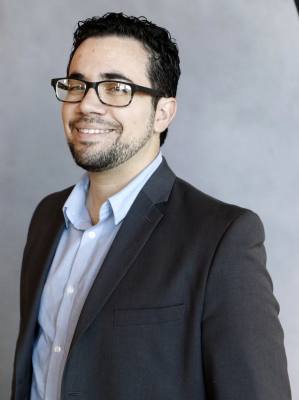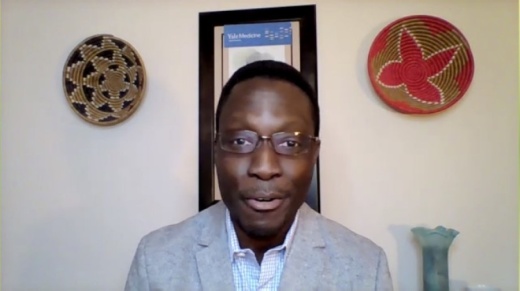Covering topics such as vaccination myths, local distribution efforts and inequities in COVID-19 responses, Hayden was joined by Onyema Ogbuagu, a Yale School of Medicine associate professor and infectious diseases specialist, and Barney S. Graham, the deputy director of the Vaccine Research Center and the National Institute of Allergy and Infectious Diseases. Amanda Masino, an associate professor of biology and the chair of natural sciences at the university, moderated the event.
Can an individual get COVID-19 from the vaccine?
Ogbuagu: That's that's definitely not true. The vaccines that are available to us in the U.S. include mRNA technologies that do not have anything that includes the real virus. I think where some of this [myth] comes from is just some of the symptoms that people develop after vaccination.
Does an individual need to get vaccinated if they have already had COVID-19?
Hayden: We have been following the CDC recommendations that says you need to wait at least 90 days before you receive the vaccine. Now, after the 90 days we are recommending people to get the vaccine.
Graham: One of the reasons to get the vaccine, even if you've been infected, [is that] the vaccine immunity is stronger than the infection immunity. You usually get better immunity from the infection than you went from a vaccination but in this case, I think there's quite a bit of evidence that the vaccine immunity is stronger.
When will the vaccine be available to individuals in groups other than 1A and 1B in Travis County?
Hayden: [Austin Public Health has] been receiving about 12,000 vaccines a week, and we know that there are 120,000 people that are 65 years of age and older [in Travis County]. So, if we just looked at providing vaccines to them, it'll be at least 10 weeks for us to be able to get through the majority of them. With hub providers, [which are] able to do thousands of vaccines a day, once they are fully operational and we have everyone working in tandem, I’m thinking probably [the] April or May time period [is when it will be available to more groups]. We should be able to get most people provided a vaccine by October of this year.
Should people who are immunosuppressed or with pre-existing conditions still get vaccinated?
Graham: You should discuss this with your local private physician and work through it with them to decide whether it's good for you to get the vaccine or not. In general, the safety record and the advocacy for these vaccines is such that your choice I think is to either eventually get infected with the virus and have a 1% or 2% chance of dying, or get the vaccine and have a one in a million chance of an allergic reaction. Am I going to take the risk of getting the infection and possibly dying or maybe having a 20% or 30% chance of long term symptoms, or am I going to take the chance with the vaccine?
Ogbuagu: [The vaccine] wasn’t really studied in a whole host of immunocompromised [individuals], and we recognize there is a data gap. The concern is that those who are immunocompromised might not mount an immune response from the vaccine to protect them, but immunocompromised people are also very vulnerable to having severe COVID-19. So we strongly recommend those individuals get the vaccine anyway and recognize that they could have diminished immune responses to that.
How can cities and counties make sure vaccines reach communities and individuals that may not trust the vaccine or the entities distributing them?
Graham: We know that there is systemic racism and bias that exists, even among our health care providers and in our hospitals. That is something that is real and true and is probably going to take many more years to resolve. One of my biggest concerns is that if we have three or four times more disease in the Black community, and then we have half as much vaccine uptake in the Black community, then a year from now the disparity [in infections within the Black and white community] is not going to be three or four times larger like it is now, it's going to be eight to 10 times the disparity.
Ogbuagu: There's a myriad of reasons why people of color don’t always trust the science or the medical community. I think we need more diversity and inclusion in the science community and in the physician community so that way the community feels that they have at least a proportional representation and stake in, you know, being part of the process. The more people that come from those communities, I think it will probably add to a little more faith and trust in the system.I also think we need to do so much better with engaging our communities and recognizing that disadvantaged communities could have many challenges with accessing medical care and resources. We should design health care and research to adapt to some of the unique needs that the community has.
Hayden: I think you have to admit what has gone wrong and acknowledge it, and then hear people. I want to know how things are working for them, and then once you hear that feedback, you need to act and make changes and be open to making changes within your organization. Ultimately you want people to feel comfortable; you want them to be able to come back to you for future services; and you also want to make sure that all of the work that you're doing is reaching the people that it is intended to.
What do new COVID-19 variants mean for the effectiveness of current vaccines?
Ogbuagu: With the new variants that are coming out, there are lessons we're learning from places like South Africa. People who were sick in the first wave of COVID-19 are getting sick from the new South Africa variant at levels that are quite concerning.
Graham: Some groups have been testing the immunity of the vaccine in people against these new variants, and there are some decreases in effectiveness against the South African strain, but we are seeing effectiveness against the disease, and even higher efficacy against severe disease. We think we have a large buffer and that these vaccines will still work against the disease that would be caused even by the South African strain. So, to me, what it means is it's even more urgent for more people to get vaccinated as soon as we possibly can.
Can you stop social distancing or wearing a mask once you have been vaccinated?
Hayden: We want you to get your vaccine, and then we want you to continue to wear your masks and social distance. We want to make sure that you adhere to both of those until further notice. So no one can go out and burn those masks right away; you have to hold onto them.





